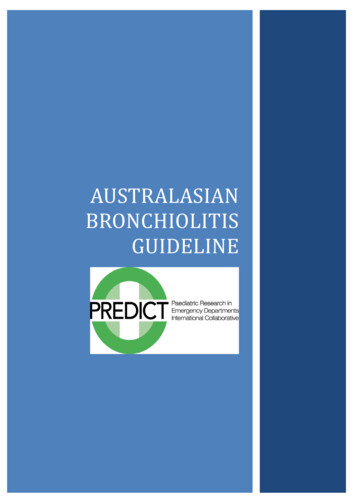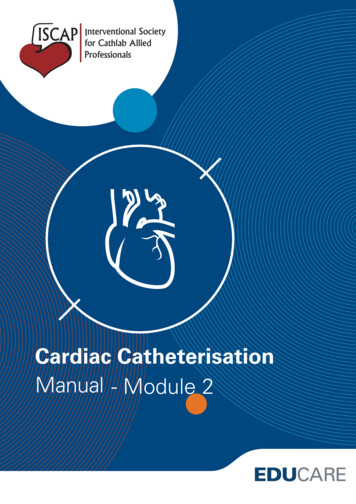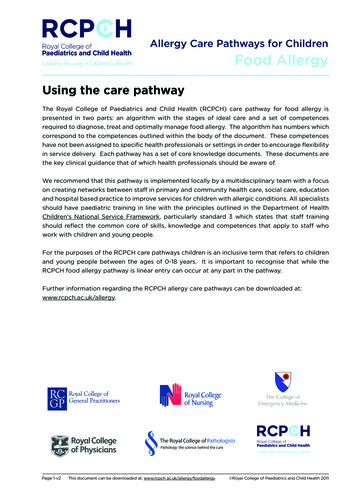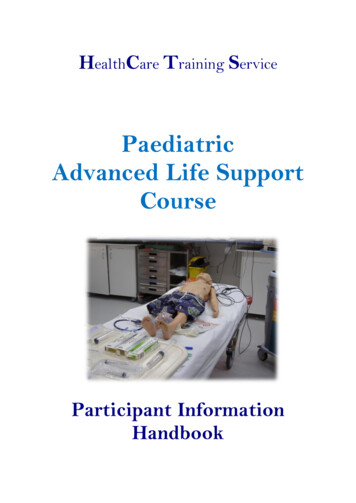
Transcription
HealthCare Training ServicePaediatricAdvanced Life SupportCourseParticipant InformationHandbook
Paediatric Advanced Life Support CourseParticipant InformationCopyright 2017 HealthCare Training ServicePO Box 426, Albany Creek QLD 4035, AustraliaCopyright Agency Limited (CAL) Licence No.: SE - 3785All rights reserved. No part of this material protected by this copyright notice may bereproduced or utilised in any form or by any means, electronic or mechanical, includingphotocopying, recording, or by any information storage and retrieval system, withoutwritten permission from the copyright owner.DisclaimerThe information presented in this course is done so for the sole instructionalpurpose of the program.HealthCare Training Service and its specialist presenters disclaim all & any liabilityfor the outcomes of any actions taken on the basis of any information presented atthis course, and are not accountable for any error in, or omission of informationpresented.
Paediatric Advanced Life Support CourseParticipant InformationContentsPageOur Organisation: HealthCare Training Service . 1Introduction . .1Broad objectives . .3Target Population . 3Prerequisites . .3Recognition Options . 4Learning Outcomes . .5Course Structure – Paediatric Advanced Life Support .6Lecture Program – Paediatric Advanced Life Support.7Course Structure – Paediatric ALS Recertification .9Lecture Program – Paediatric ALS Recertification . .10Teaching & Learning Strategies . . 12Assessment . . 12Examination . 12Competency Assessment . . 13Exit Criteria . . 13Failure to Complete . . 13Appeals Process . 15Course Evaluation . 15Material Resources . . 16Human Resources . . 16Curriculum Review . 16Records Maintenance. . 17Participant Privacy . 17Maintaining Competence . . 17Location and Frequency of Course . . 18Enrolment and Management Course Fees . . 18Course Coordinator / Facilitators . . 19Access to ALS Course Coordinator/Facilitator . 19Administration Officer . 19Resources Manager . 20HealthCare Training Service 2017Paed ALS/ParticInfo/V7/D0312/R0417
Paediatric Advanced Life Support CourseParticipant InformationReferences . 21Further References . 22HealthCare Training Service 2017Paed ALS/ParticInfo/V7/D0312/R0417
Paediatric Advanced Life Support CourseParticipant InformationHealthCare Training Service (HCTS)HealthCare Training Service is a training and professional development company with thevision to provide quality training and education to Health Care Professionals. Our aim is toprovide our colleagues with the knowledge, skills and confidence to fulfil their role in acompetent and efficient manner. Our motto: ‘.providing skills and confidence in AdvancedLife Support’.HealthCare Training Service has an established Code of Practice as outlined in this curriculumdocument and in the Company Profile statement. Legislative requirements and qualityprocesses are strictly adhered to as a mandatory requirement for all accredited educationproviders.Our postal address is PO Box 426, Albany Creek, Queensland 4035. If you need to contact theHealthCare Training Service team for further information about this program you may utilisethe following avenues:Telephone:Fax:Mobile:Email:Web:07 3325 0188 (Office Hours)07 3325 03880419 675 740mail@hcts.com.auwww.hcts.com.auPaediatric Advanced Life Support CoursesIntroductionAs defined by the Australian Resuscitation Council (Guideline 11.1), “Advanced Life Support(ALS) is Basic Life Support (BLS) with the addition of invasive techniques, eg: defibrillation,advanced airway management, intravenous access and drug therapy.”The Paediatric Advanced Life Support (PALS) Course and the Paediatric ALS (PALS)Recertification Course provide the learner with a foundation in theoretical knowledge and theapplication of practical skills within a solid problem-solving framework essential in paediatricadvanced resuscitation.Life threatening paediatric emergencies arise suddenly and indiscriminately requiring the swiftresponse of Medical Officers, Registered Nurses and Paramedics. The response of suchpersonnel needs to be efficient and effective, as time is critical especially in paediatricresuscitation where oxygen demand is high. Through undertaking a Paediatric Advanced LifeSupport (PALS) Recertification course personnel are able to maintain their knowledge base andcompetence in areas pertinent to paediatric resuscitation. The Paediatric Advanced LifeSupport Recertification course covers Basic Life Support, Basic and Advanced AirwayManagement, Rhythm Recognition, Defibrillation, Emergency (ALS) drugs, as well as theManagement of a Paediatric Cardiac Arrest (PALS Algorithm), Post Resuscitation Care andcare for Family Members. This course is extremely relevant for all health care practitioners tosupport continued best practice in the resuscitation of an infant or child.HealthCare Training Service 2017Paed ALS/ParticInfo/V7/D0312/R0417Page 1
Paediatric Advanced Life Support CourseParticipant InformationThe PALS Recertification course incorporates more than the provision of information,assessment of knowledge base and demonstration of psychomotor skills. It encompasses therole of the team cohesively approaching the resuscitation of an infant or child suffering a lifethreatening emergency, in a systematic and controlled manner.This program is a Paediatric Advanced Life Support Recertification Course and is consistentwith guidelines produced by the Australian Resuscitation Council (ARC), which is Australia’snational representative on the International Liaison Committee on Resuscitation (ILCOR).Our Paediatric Advanced Life Support Courses have been accredited by the Australian Collegeof Rural and Remote Medicine (ACRRM). Attendance at the Paediatric Advanced LifeSupport Course earns the following points: 10 Advanced Life Support points 20 PRPD points 30 MOPS points Emergency MedicineGrant Eligibility: Emergency MedicineACRRM ID: 7945Attendance at the Paediatric ALS Recertification Course earns thefollowing points: 10 Advanced Life Support points 2 PRDP points 12 MOPS points Emergency MedicineACRRM ID: 7951Our Paediatric Advanced Life Support Courses have been approved by the Royal AustralianCollege of General Practitioners (RACGP) QI &CPD Program earning General Practitionersthe following points: The Paediatric Advanced Life Support Course earns General Practitioners Total 40Category 1 Points (CPR inclusive), Activity No. 84065. The Paediatric ALS Recertification Course earns General Practitioners Total 40Category 1 Points, Activity No. 84088.Our Advanced Life Support Courses have also been accredited by the Australian & NewZealand College of Anaesthetists (ANZCA) CPD Program and participants may claim theirattendance at the Advanced Life Support Course as an emergency response activity in theirCPD portfolio. Emergency response activity: Cardiac arrest (PB ALS) Recognition code: ER-14-CA-021Continuing Professional Development (CPD) PointsIn addition, attendance at this course provides Registered Nurses with Continuing ProfessionalDevelopment (CPD) hours as part of their planned learning activities to maintain, improve andbroaden knowledge, expertise and competence. (Nursing and Midwifery Board of Australia,March 2010).HealthCare Training Service 2017Paed ALS/ParticInfo/V7/D0312/R0417Page 2
Paediatric Advanced Life Support CourseParticipant InformationBroad Course ObjectivesFollowing successful completion of this course the learner will be able to: Explain the physiological and pathophysiological response to physical compromiseculminating in cardio-respiratory failure. Demonstrate advanced knowledge and clinical competence in the following: Basic Life Support Basic and Advanced Airway Management Demonstrate advanced knowledge and clinical competence in cardiac monitoring includingarrhythmia analysis and management. Explain the indications for, correct dose and adverse effects of the primary resuscitationdrugs. Demonstrate advanced clinical problem-solving skills and clinical competence in thecohesive management of life threatening situations (cardiac arrest management) inaccordance with the Australian Resuscitation Council (ARC) Guidelines. Identify and outline the roles and responsibilities of the Paediatric Advanced Life SupportTeam and the Paediatric Advanced Life Support certified personnel. Outline the management of the infant/child immediately post-resuscitation. Discuss management of the family during and post resuscitation events. Discuss the need for and implementation of Critical Incident Debriefing. Discuss legal, ethical and occupational health and safety issues in relation to ALSinterventions.Target Population The ALS course is designed for Registered Nurses and Medical Personnel with at least six(6) months experience within the acute care setting. Ambulance personnel, Paramedics and Medics with acute field experience are also eligibleto attend the program.Prerequisite The participant is to hold a current practicing licence as either a Medical Officer,Registered Nurse, Paramedic or Medic. It is mandatory for participants attending the Paediatric ALS course and Paediatric ALSRecertification Course to complete all pre-reading material including review questions{timeframe approximately five (5) hours} prior to attending either course. The coursematerials will be sent to the participant at least three (3) weeks prior to the date of thecourse. The completed pre-reading material must be brought with the candidate to thecourse. The pre-reading material will be reviewed to assess completeness prior to thecandidate being permitted to commence the course proper. Participants attending the Paediatric ALS Recertification Course must ensure theycomprehend all the material presented in the course manual and review questions priorto attending the recertification program.HealthCare Training Service 2017Paed ALS/ParticInfo/V7/D0312/R0417Page 3
Paediatric Advanced Life Support CourseParticipant Information Enrolment in the Paediatric ALS Recertification Course is dependent upon recognition ofprior learning (RPL) and participants must meet one of the three (3) Recognition Optionscriteria (see Recognition Options below) to permit attendance in the Paediatric ALSRecertification Course. If the participant does not meet one of the three RecognitionOptions criteria stated, the participant will need to enrol in the full Paediatric AdvancedLife Support Course.Recognition OptionsParticipants seeking any of the recognition options stated below should advise the PALSCoordinator at the time of enrolment to obtain the relevant enrolment form and package.Recognition of Prior Learning is required for enrolment in the Paediatric ALS RecertificationCourse.Recognition of Current Competence (RCC)HealthCare Training Service will provide RCC where a participant has previously successfullycompleted all requirements of the full Paediatric Advanced Life Support Course or PaediatricALS Recertification Course within the preceding twelve (12) months and is required to bereassessed to ensure that competence is being maintained. RCC does not include anyadditional training of paediatric advanced life support competency. If RCC can bedemonstrated by the participant, the participant is entitled to enrol in the Paediatric ALSRecertification Course.Recognition of Qualifications issued by other accredited PALS ProvidersHealthCare Training Service recognises Paediatric Advanced Life Support Certification andstatements of attainment issued by any other accredited Paediatric Advanced Life Support(PALS) Course provider. A participant who holds certification of Paediatric ALS competencycompleted by the participant within the preceding twelve (12) months will be entitled to enrolin the Paediatric ALS Recertification Course.Recognition of Prior Learning (RPL)Recognition of prior learning is available to all HealthCare Training Service participants. RPLis a process that recognises the individual’s non-formal and informal learning to determine theextent to which that individual has achieved the required learning outcomes or competencyoutcomes. RPL does not include additional training of advanced life support competency.RPL involves the assessment of previously unrecognised skills and knowledge an individualhas achieved outside of an accredited Paediatric Advanced Life Support Course. To achieveRPL the individual will need to demonstrate advanced knowledge and clinical competence inadvanced life support practices. This may be achieved through the successful completion of anun-accredited paediatric advanced life support course and/or demonstrated extensiveexperience in a paediatric critical care, paediatric emergency or paediatric trauma unit.A participant who demonstrates prior learning and competence in advanced life support will beentitled to enrol in the Paediatric ALS Recertification Course. Participants wishing to applyfor RPL should contact the Paediatric ALS Course Coordinator to discuss their suitability forRPL.HealthCare Training Service 2017Paed ALS/ParticInfo/V7/D0312/R0417Page 4
Paediatric Advanced Life Support CourseParticipant InformationLearning OutcomesOn successful completion of the Paediatric Advanced Life Support Course participants will beable to:1. Outline priorities in patient assessment and management.2. Demonstrate paediatric basic life support knowledge and apply paediatric basic lifesupport skills.3. Employ basic and advanced airway management techniques to secure and maintain apatent airway for an infant and a child.4. Demonstrate effective ventilation using a bag-valve-mask device.5. Recognise and institute appropriate management for life threatening arrhythmias.6. Identify, discuss and implement appropriate use of emergency drug therapy.7. Discuss the Paediatric ALS algorithm and demonstrate management of cardiac arrestaccording to the Paediatric ALS algorithm.8. Demonstrate effective resuscitation team dynamics during cardiac arrest scenarios.9. Perform decision making skills in a cardiac arrest situation.10. Identify occupational health and safety concerns.11. Discuss ethical and legal implications in a cardiac arrest situation.12. Explain post-resuscitation care of an infant/child following cardiac arrest.HealthCare Training Service 2017Paed ALS/ParticInfo/V7/D0312/R0417Page 5
Paediatric Advanced Life Support CourseParticipant InformationPaediatric Advanced Life Support CourseStructureThe course is conducted over one (1) day or seven (7) hours, consisting of two (2) essentialcomponents:1. Theoretical componentThe theoretical component is presented over four (4) hours of direct face-to-face contactinvolving lecture presentation, group work, group discussion and demonstration.The theoretical information presented is supported by associated reading material.There is one (1) theoretical examination with an allocated completion time of twentyfive (25) minutes.The lecture program will provide a baseline framework upon which knowledge andskills will be developed. Participants will be encouraged to critically examine theirindividual resuscitation knowledge and skills, as well as reflect upon contextual issueswithin the function of this complex role.In addition to the examination paper, the participants’ knowledge will also be assessedthrough undertaking the competency assessments. This will demonstrate their abilityto understand, analyse and apply the theoretical information presented in the course.2. Practical componentThe practical component is presented over two & three-quarter (2 ¾) hours and consists ofthe participants practising their Paediatric Advanced Life Support skills with support andconstructive feedback being provided by an experienced facilitator. This will assist thelearner to apply theory to practice in a safe and efficient manner.Participants will then demonstrate their competency of clinical skills through successfulachievement of the following competency assessments: Basic Life Support Advanced Airway Management Cardiac Arrest Management (Clinical Scenarios)The broad program objectives, content outline, lecture program, examination, competencyassessment criteria and associated reading material will set the direction for learning outcomes.HealthCare Training Service 2017Paed ALS/ParticInfo/V7/D0312/R0417Page 6
Paediatric Advanced Life Support CourseParticipant InformationLecture ProgramUnit1. Priorities inEmergency Careand Basic LifeSupportObjectivesDiscuss early recognition of thedeteriorating paediatric patient andprevention of cardiac arrest.Time(mins)90Discuss The National Safety and QualityHealth Service Standard 9: ClinicalDeterioration in Acute Health Care.Practicalcompetency assessedduring themanagement ofclinical scenariopractise sessionsKnowledgeassessment as partof theoreticalexamination.Identify the common causes ofcardiopulmonary arrest.Discuss the priorities in emergency care.Review Basic Life Support following theDRSABCD acronym.Demonstrate BLS skills.2. Basic & AdvancedInstruction and demonstration of airwayAirway Management management techniques including:Assessment60 Head Tilt, Chin Lift (as required for age) Jaw Support Airway clearance sessment as partof theoreticalexamination.Explain and demonstrate the use of thefollowing airway management adjuncts: Oropharyngeal Airway Nasopharyngeal Airway Bag-valve mask apparatusDiscuss the intubation procedure.Describe the endotracheal tube andcorrect positioning of same.Outline complications associated withintubation.Demonstrate the role of the assistantduring intubation.Discuss laryngeal mask airways (LMAs).Demonstration the insertion of LMAs.Describe the correct positioning of LMAs.Discuss the advantages anddisadvantages of LMAs.3. RhythmRecognitionIdentify normal sinus rhythm.Identify compromising & life threateningarrhythmias.HealthCare Training Service 2017Paed ALS/ParticInfo/V7/D0312/R041730Knowledgeassessment as partof theoreticalexamination.Also assessed as partof clinical scenariocompetencyassessment.Page 7
Paediatric Advanced Life Support CourseUnitObjectivesParticipant InformationTime(mins)Assessment4. DefibrillationExplain the physiological response todefibrillation.Identify the need for emergencydefibrillation.Describe the safe application ofdefibrillation.30Knowledgeassessment as partof theoreticalexaminationAlso assessed as partof megacodemanagementcompetencyassessment.5. ALS DrugsOutline the indications, action, dose,route of administration and adverseeffects of the primary resuscitationdrugs, including:30Knowledgeassessment as partof theoreticalexamination. 6. PALS Algorithms7. Post ResuscitationCare7.1 Immediate postarrest management7.2 Ethical & LegalIssuesAdrenalineAmiodarone / LignocaineCalcium ChlorideMagnesiumPotassiumSodium BicarbonateAlso assessed as partof megacodemanagementcompetencyassessment.Outline the ARC guidelines forappropriate management of lifethreatening situations.Identify and competently follow theappropriate algorithm for a simulatedresuscitation event.Demonstrate effective and cohesivemanagement of a paediatric advancedresuscitation situation in a simulatedenvironment.150Outline the further assessment andmanagement of the individualimmediately post-resuscitation.Discuss the phases of the postresuscitation syndrome.15Discuss ethical & legal issues associatedwith resuscitation including: Criteria for terminatingresuscitation efforts Presence of family duringresuscitation attemptsKnowledgeassessment as partof theoreticalexamination.Also assessed as partof cardiac arrest(clinical ssessment as partof theoreticalexamination.Also assessed as partof megacodemanagementcompetencyassessment.Discuss care of the patient’s family.Discuss the purpose and implementationof critical incident debriefing.HealthCare Training Service 2017Paed ALS/ParticInfo/V7/D0312/R0417Page 8
Paediatric Advanced Life Support CourseParticipant InformationPaediatric ALS Recertification CourseStructureThe Paediatric Advanced Life Support Recertification course is conducted over four and a half(4 ½) hours, consisting of two (2) essential components:A. Theoretical componentThe theoretical component consists of pre-reading material and completion ofPaediatric ALS review questions, with an allocated timeframe of completion of five (5)hours, as well as an additional two & a half (2 ½) hours of direct face-to-face contactreviewing current guidelines, activity sheets and PALS algorithm. This session willinclude lecture presentation, group discussion, demonstration and written work.The theoretical information presented is supported by associated reading material.There is one (1) theoretical examination with an allocated completion time of twentyfive (25) minutes.The course material will provide the supporting framework upon which knowledge andskills will be updated, refreshed and consolidated. Participants will be encouraged tocritically examine their individual resuscitation knowledge and skills, as well as reflectupon contextual issues within the function of this complex role.In addition to the examination paper, the participants’ knowledge will also be assessedthrough undertaking the competency assessments. This will demonstrate their abilityto understand, analyse and apply the theoretical information presented in the course.B. Practical componentThe practical component is presented over two (2) hours and consists of the participantspractising their Paediatric Advanced Life Support skills with support and constructivefeedback being provided by an experienced facilitator. This will assist the learner to applytheory to practice in a safe and efficient manner.Participants will then be required demonstrate their competency of clinical skills throughsuccessful achievement of the following competency assessments:(1) Basic Life Support (1a: Infant & 1b: Child)(2) Advanced Airway Management(3) Cardiac Arrest Management (Clinical Scenarios)The broad program objectives, content outline, lecture program, examination, competencyassessment criteria and associated reading material will set the direction for learning outcomes.HealthCare Training Service 2017Paed ALS/ParticInfo/V7/D0312/R0417Page 9
Paediatric Advanced Life Support CourseParticipant InformationLecture ProgramUnit1. Review of currentguidelines andevidence basedpractice inresuscitation.ObjectivesReview Basic Life Support followingthe DRSABCD acronym.Time(mins)60Discuss current guidelines andcurrent research findings in relationto resuscitation.Discuss latest emergency drugtrends, forms, presentation andpackaging.Instruction and demonstration ofairway management techniquesincluding:Practical competencyassessed during themanagement of clinicalscenario practisesessionsKnowledge assessmentas part of theoreticalexamination.Discuss trends in defibrillation andcurrent defibrillation protocols.2. Basic & AdvancedAirway ManagementAssessment20Practical competencyassessment.Knowledge assessmentas part of theoreticalexamination. Head Tilt, Chin Lift (as required for age) Jaw Support Airway clearance procedureExplain and demonstrate the use ofthe following airway managementadjuncts: Oropharyngeal Airway Nasopharyngeal Airway Bag-valve mask apparatusDiscuss the intubation procedure.Describe the endotracheal tube andcorrect positioning of same.Outline complications associated withintubation.Demonstrate the role of the assistantduring intubation.Discuss laryngeal mask airways(LMAs).Demonstration the insertion ofLMAs.Describe the correct positioning ofLMAs.Discuss the advantages anddisadvantages of LMAs.Unit3. RhythmObjectivesIdentify normal sinus rhythm.HealthCare Training Service 2017Paed 5Knowledge assessment asPage 10
Paediatric Advanced Life Support CourseRecognitionParticipant Informationpart of theoryexamination.Identify compromising & lifethreatening arrhythmias.Also assessed as part ofclinical scenarioscompetency assessment.4. Defibrillation5. PALS Algorithms(Cardiac ArrestManagement)Explain the physiological response todefibrillation.Identify the need for emergencydefibrillation.Describe the safe application ofdefibrillation.20Outline the ARC guidelines forappropriate management of lifethreatening situations.Identify and competently follow theappropriate algorithm for a simulatedresuscitation event.120Demonstrate effective and cohesivemanagement of a paediatric advancedresuscitation situation in a simulatedenvironment.Discuss care of the patient’s significantothers.Discuss the purpose andimplementation of critical incidentdebriefing.HealthCare Training Service 2017Paed ALS/ParticInfo/V7/D0312/R0417Knowledge assessment aspart of theoreticalexaminationAlso assessed as part ofmegacode managementcompetency assessment.Knowledge assessment aspart of theoreticalexamination.Also assessed as part ofcardiac arrest (clinicalscenario) managementcompetency assessment.Page 11
Paediatric Advanced Life Support CourseParticipant InformationTeaching & Learning StrategiesLecture presentationGroup discussionCase ScenariosReflective PracticeDemonstrationSimulationRole playA combination of the various training strategies will be utilised to accommodate the differinglearning styles of our participants, the visual learner, the auditory learner, and the kinaestheticlearner, will be catered for. Training pace may also be altered when possible to accommodatevarying pace of learning for our adult participants. Both reflective practice and experientiallearning will be utilised to enhance learning outcomes.AssessmentThere are four (4) components to the assessments. Learners are required to pass both thetheoretical and clinical components of the course in order to achieve a pass for the overallcourse.AssessmentPass Mark1. ExaminationOne (1) written examination will beundertaken during the course. Thisassessment will include both rhythm stripanalysis and multiple-choice questions.80%LearningOutcomeAssessed1, 2, 3, 5, 6, 7,10, 122. Basic Life Support CompetencyPass Achieved1, 2, 3, 43. Basic & Advanced Airway ManagementCompetencyPass Achieved3, 44. Cardiac Arrest (Clinical Scenario)Management CompetencyPass Achieved1, 2, 3, 5, 6, 7,8, 9, 10, 11, 12ExaminationThere will be one (1) written examination to assess the learners understanding of thetheoretical information and concepts presented. The examination will take place at the end ofthe course.The examination paper will involve rhythm strip analysis and multiple-choice questions.The examination is of twenty-five (25) minutes duration.Participants are required to achieve a minimum of 80% for the theoretical examination. Shoulda participant be unsuccessful in achieving the minimum grade of 80%, s/he will be offered anopportunity to undertake a supplementary examination within two (2) weeks of the completionof the course.HealthCare Training Service 2017Paed ALS/ParticInfo/V7/D0312/R0417Page 12
Paediatric Advanced Life Support CourseParticipant InformationCompetency AssessmentThe practical competency assessments will be undertaken during the course. This will includeoral questioning of the participant and observation of the participant’s ability in each of thefour competency areas: Basic Life Support for an infant and a child, Basic & Advanced AirwayManagement and Cardiac Arrest (Clinical Scenario) Management.The participants will be assessed against the competency performance criteria, and rated aseither achieving or not achieving a competent level of practice. The competency assessmentcriteria for the practical assessments will be distributed to the participants with the coursenotes at least three (3) weeks prior to the commencement of the program. During the coursethe participants will have an experienced clinical facilitator supporting them and providingconstructive feedback regarding performance.Participants are required to achieve 100% pass for each of the competency assessments.Participants who do not successfully achieve competence for any of the practical assessmentswill be provided with feedback and consultation with the PALS course coordinator.The participant will be provided with a second opportunity to successfully achieve competencyduring the running of the course. If competency is not achieved on the second attempt, theparticipant will be advised to undertake the entire Paediatric Advanced Life Support Courseagain at a later date.Exit CriteriaParticipants are required to successfully pass all assessment criteria for the course includingtheoretical and practical competency assessments to be awarded a HealthCare Training ServiceCertificate of Attainment in Paediatric Advanced Life Support.Should a participant be unsuccessful in passing all assessment items for the course (eithertheoretical or practical), the participant will be awarded a HealthCare Training ServicePaediatric Advanced Life Support Certificate of Attendance only outlining course content andduration.If a participant is unsuccessful in completing the course an opportunity will be made forreassessment – please see “Appeals Process”.A participant who undertakes and successfully completes the Paediatric Basic Life SupportCompetency assessments but fails to successfully complete the Paediatric Advanced LifeSupport Com
reassessed to ensure that competence is being maintained. RCC does not include any additional training of paediatric advanced life support competency. If RCC can be demonstrated by the participant, the participant is entitled to enrol in the Paediatric ALS Recertification Course. Recognition of Qualifications issued by other accredited PALS .
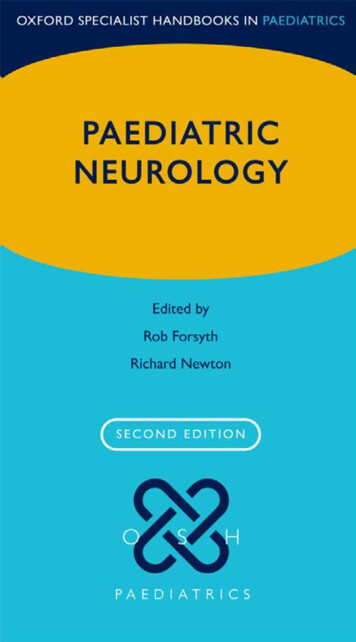
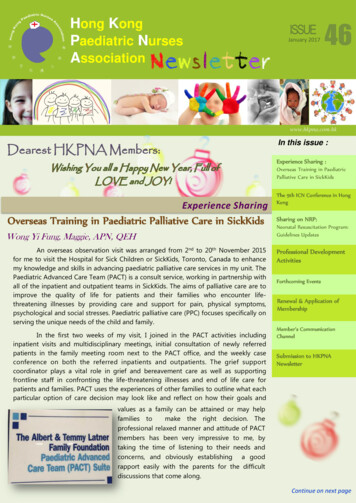
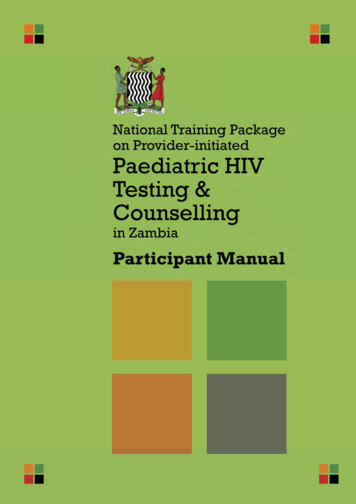
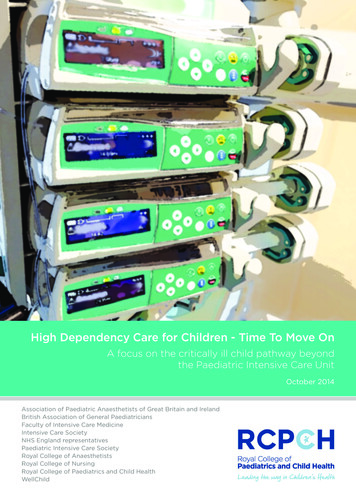

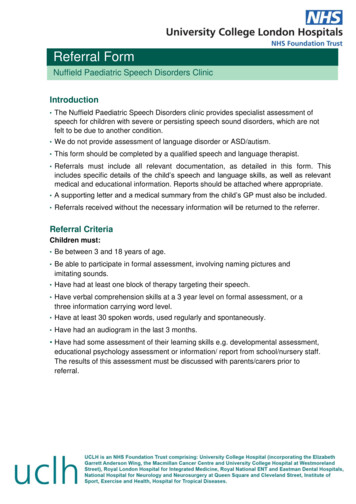
![Medical Training Initiative Post [Paediatric Neurology]](/img/35/cardiff-paediatric-neurology-mti-job-description-for-march-2020.jpg)
